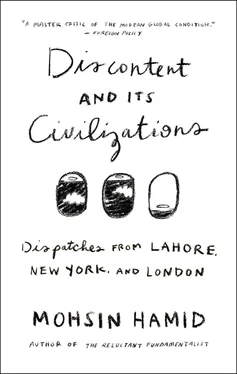Fringe politicians were not far behind. Perhaps smarting from the recent Rimsha Masih fiasco — in which they had championed the execution of a fourteen-year-old mentally disabled Christian girl for the crime of blasphemy, only to be roundly rebuffed by a rare confluence of sane elements within Pakistan’s legal system, media, civil society, and clergy, who collectively revealed that she had been framed by a property-coveting local mullah — they were eager to fan the momentarily sputtering violently righteous religious flame.
The protests they instigated gathered force. Two people had already died. In today’s Pakistan, tragically, this is not uncommon. But there was a sense that things would intensify. Like weather channels giddy on the news of a menacing tropical depression, the local media reported an increase in emotional wind speed. Shouting politicians announced the formation of a telltale eye at the center of an anti-anti-Islam-film hurricane. It would, all agreed, make landfall on Friday, after the weekly communal prayer.
This also happened to be my three-year-old daughter’s first week of school. She cried every morning as we dropped her off, apparently a sign of healthy attachment, though easily misconstrued (by me) as an indication that some great barbarism was being perpetrated.
So I was upset when the government declared Friday a public holiday, and not just any public holiday — Pakistan’s (and possibly the world’s) first Love the Prophet Day. The last thing my daughter needed was a three-day weekend just as she was beginning to settle in.
Views here were split. Some commentators lambasted the supposedly liberal, supposedly left-of-center Pakistan Peoples Party — led government for ceding space to extremists, for in effect declaring Love Burning and Looting and Pillaging Day, for not having the gumption to stand up and say that no matter how offensive the film, no one had the right (or indeed any reason) to kill one’s fellow Pakistanis over it, to destroy public property, as would certainly happen, or to bring anarchy onto our streets. Surely the real problem that needed to be addressed was one of faulty logic, what might be termed a “someone has made a hateful film in America so now I ought to get shot by a Pakistani police officer” fallacy.
Others thought that the government had acted wisely, or at least shrewdly, in getting ahead of the curve, possibly co-opting the mounting indignation and reducing the potential for confrontation.
Still others thought that the government was a bunch of American/Zionist/Indian lackeys no matter what public holidays they declared, and that they deserved to burn in hell along with the filmmakers and, presumably, anyone else who happened to be in the wrong place at the wrong time on Friday.
My daughter was pleased that she would have a “day off”—after a life total of four days on.
The hurricane approached. People began their preparations. We did our grocery shopping on Thursday evening (the streets were packed; the traffic was terrible). My driver, a Christian, asked if he could stay home from work (the answer was yes). The birthday party of one of my daughter’s classmates was canceled.
I woke up at seven a.m. on Friday. It was quiet. It isn’t always quiet at our house. We can usually hear rumbling trucks and sputtering rickshaws and sometimes the shrieks of motorcycle daredevils as they race by, pulling wheelies. When the Sri Lankan cricket team was attacked in 2009, the automatic-weapon fire was clearly audible here. When bombs were going off more regularly a couple of years ago, the blast wave of one of them was powerful enough to rattle the windows.
Today there were birds chirping. And my phone had no signal. The government had turned off mobile-telephone networks as a precaution. (Mobiles are occasionally used as detonators for explosives and, more commonly, for communications among militants during their operations.)
Fortunately BBM works over Wi-Fi, and those of us in my chat group who had functioning Internet at home (about half of us) were able to keep each other abreast of the latest developments. One reported that a sign saying “Death to Sam and Terry” had gone up on Lahore’s main British-era thoroughfare, the Mall. I could guess who Sam was: Sam Bacile, a pseudonym of the hated filmmaker. But who, I asked, was Terry? “Florida preacher,” came the response. “Koran-burning day.”
The hurricane hit. On my TV set, Pakistan was aflame. E-mails from friends abroad asked after my well-being. I went out for a drive in the afternoon and things in my neighborhood were utterly calm — disconcertingly so, for mine is normally a bustling area to which the word “calm” does not usually apply. This reinforced the idea that Pakistan is a big country. A hundred and eighty million people is a lot of people. Pitched battles between protesters and police can be going on in one place, barriers made of shipping containers can be breached by mobs in another, and cinemas can be burned to the ground in a third — all of which did occur that day — and yet, in most locales, with the naked eye, you will see none of this.
Phone service was restored that night. Blogging, text messaging, op-ed-page comment posting, etc., resumed in earnest on Saturday. By most accounts, approximately twenty people had been killed across the country: rioters, police, a TV cameraman, bystanders. Among my Lahori friends there was an air of sadness, depression. Others were more proactive, like the five thousand students who signed up to coordinate cleanup efforts in Islamabad, Lahore, and Karachi through their dedicated Facebook page and the Twitter hashtag #Project CleanUpForPeace.
One friend sent, via BBM, a picture he had just taken of a rickshaw with these words written, in English, on the back of its fabric-covered cabin: “Don’t Angry Me.”
It was probably a reference to a popular Bollywood film. But I was reminded of the Gadsden flags I had seen flying, years ago, on a trip to South Carolina: bright yellow, with a rattlesnake and a warning, “Don’t Tread on Me.” Who knows, maybe the rickshaw driver had come back home from the United States after 9/11. Or maybe he’d stumbled upon that slogan, popular during the American revolution, on Google. Or maybe he’d even caught it in a clip, on a slow-buffering visit to YouTube, fluttering in the crisp breeze of freedom.
(2012)
Personal and Political Intertwined
WHEN I WAS writing my first novel, Moth Smoke , I tried to use imagery to reveal the mental state of the main character. It doesn’t rain because a character is sad, of course, but a sad character, or so my thinking went, is more likely to notice the rain — and therefore, while narrating, to comment upon it.
My next novel, The Reluctant Fundamentalist , was in many ways quite different from its predecessor, but it, too, asserted a link between interior and exterior worlds. The notion that the personal and the political are inescapably intertwined was one I continued to hold strongly.
It was early in the process of working on my third novel that I moved back to Lahore, where I had grown up. The year was 2009. I had spent much of the 1990s in New York, writing about the Lahore of Moth Smoke . I had spent much of the 2000s in London, writing about the New York of The Reluctant Fundamentalist . Now, I thought, I would try my hand at living in a country and writing about it at the same time.
So, as I ruminate on the not-yet-four years I have spent in Pakistan, on how the country has changed and evolved over this time, I find myself questioning my impressions. How much, I wonder, is the Pakistan that I see actually a reflection of my own life? How much of what I imagine to be its changes are in reality merely echoes of my own moods, my emotions?
Читать дальше












